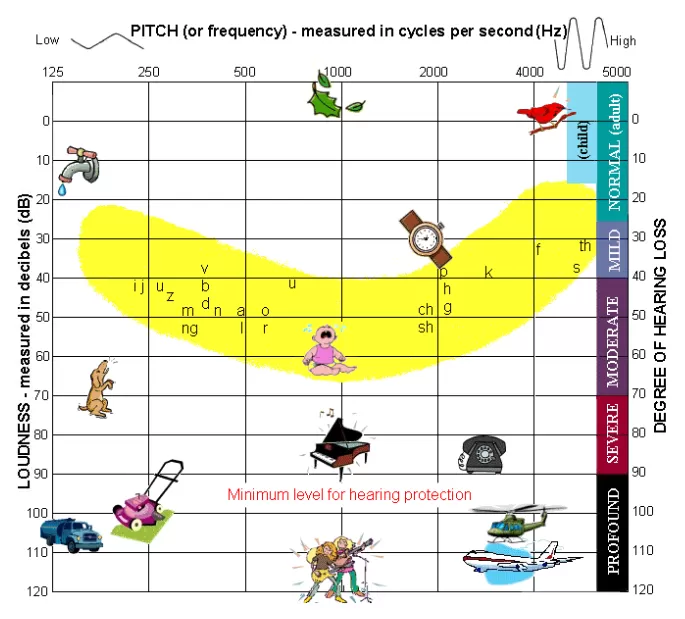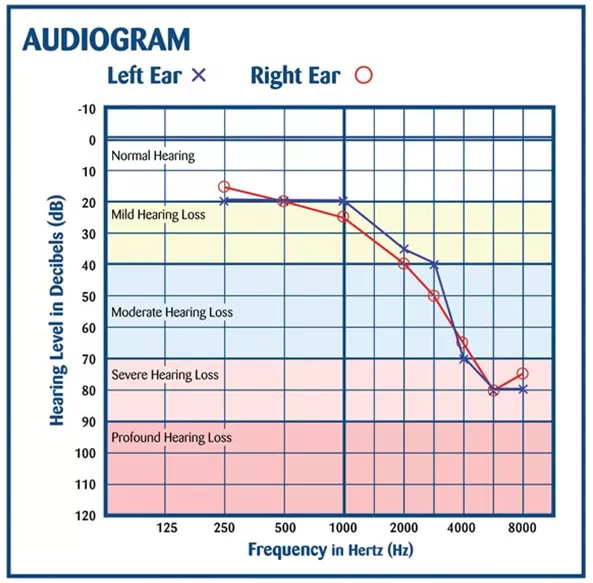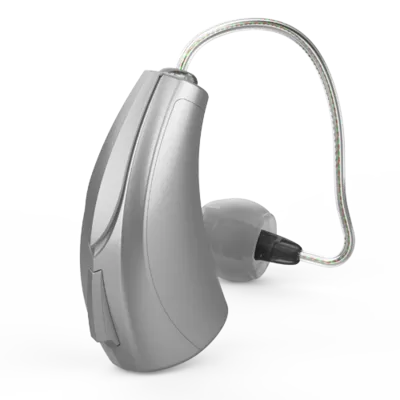High Frequency Hearing Loss
Symptoms, causes and treatment options
Approximately 15% of American adults (37.5 million) aged over 18 report some trouble hearing.
The vast majority of these individuals have what is called high frequency hearing loss.
High frequency hearing loss has various symptoms, causes, and treatment options.
In this post we’ll review everything you might want to know about high frequency hearing loss and hopefully help provide some answers you’re looking for.
What is high frequency hearing loss?
As the name implies, high-frequency hearing loss is when you have a hard time hearing high frequency sounds.
What are high frequency sounds, and how do you know if you have a hard time hearing them?
To answer the first part of that question, it’s important to first understand the nature of sound.
All sounds fall somewhere on the frequency spectrum from low to high frequency.
The “speech banana” (shown below) is a chart used to help illustrate where common sounds and phonemes fall on the frequency spectrum.

The horizontal axis at the top of the chart shows the frequency ranges, and anything to the right of 2000 Hz is considered high frequency sound.
Examples of high frequency sounds include birds chirping and telephones ringing.
How to know if you have a high frequency hearing loss
You probably have a high frequency hearing loss if you have difficulty hearing any of the sounds or phonemes on the right side of the speech banana above, or if you’ve experienced any of these symptoms.
To verify that you indeed have a high frequency hearing loss, it’s best to have a licensed hearing care professional administer a hearing test.
During a hearing test, you’ll be asked to raise your hand or press a button when you hear a beep.
The beeps sound like different pitches, like the keys on a piano. Your hearing care provider calls them different frequencies, and based on your responses, makes a graph called an audiogram.
If you have a high frequency hearing loss, your audiogram will look similar to this:

The frequencies are charted on the horizontal axis along the bottom, from 125 Hz - 8000 Hz.
Along the vertical axis is the loudness level at which the individual reported hearing the given sound.
The further towards the bottom the point is plotted, the worse the individual’s hearing at that frequency.
If you remember, we consider everything to the right of 2000 Hz to be high frequency sound.
So on the audiogram above, the marks closest to the bottom of the chart are to the right side of 2000 Hz, indicating the individual has a harder time hearing high frequency sounds.
Symptoms of High Frequency Hearing Loss
In this article, we focus on high-frequency sensorineural hearing loss caused by damage to your inner ear (cochlea) or the nerves that carry sound to your brain.
Less commonly, you might have a conductive hearing loss, where sound is blocked from getting into your ears. The blockage could be wax or fluid behind your eardrum.
People who have high-frequency hearing loss may experience:
- The perception that everyone is mumbling. When you have more problems hearing consonant sounds like “s,” “sh,” and “t,” speech will sound muffled to you. You may think that other people are mumbling.
- Trouble hearing in restaurants. You may have a hard time understanding what people are saying to you when there is a lot of background noise or in a group.
- The need to increase the volume on the TV. Television shows have a variety of accents, music, and sound effects, all of which make it harder for you to understand the speakers.
- Not waking up to fire alarms. Most fire alarms in homes emit high-frequency tones between 3000 and 4000 Hz
- Less enjoyment of outdoor activities. If you cannot hear the birds chirping and the water bubbling in the river, you may feel as if you have lost touch with nature.
- Ringing in the ears (tinnitus). Hearing loss can lead to tinnitus because your brain no longer hears the full range of sounds. Your brain generates phantom sounds in the place of the sounds that you no longer hear.
- Communication problems with family. When you have hearing loss, family members may lose patience with your requests for them to repeat themselves. You may be tempted to “bluff” and pretend to understand when you don’t.
- Withdrawing from social activities. If it’s hard for you to interact with family and friends, you may not make the effort to attend social gatherings.
- Depression and anxiety. Increased social isolation, problems staying oriented to surroundings, and work challenges could lead to depression and anxiety.
- Increased fatigue. Hearing loss means that you have to work harder to pay attention to people all day long. This can make you tired.
Causes of high frequency hearing loss
Our ears go through a lot of wear and tear during a lifetime. Your hearing loss likely results from a combination of factors over time.
Some common contributors to hearing loss include:
- Aging: By the time you reach age 65, you have a 33% chance of having some hearing loss.
- Noise exposure: If you spend a lot of time at rock concerts, playing in an orchestra, work in a factory, or shoot guns, you may over time develop noise-induced hearing loss if you do not wear hearing protection.
- Ototoxic medications: Some medications cause damage to the hearing and balance portions of your ear. Examples include chemotherapy drugs containing platinum (the name typically ends in -platin) and aminoglycoside antibiotics (the name typically ends in -mycin or -micin).
- Acoustic neuroma: Also known as a vestibular schwannoma, an acoustic neuroma is a tumor on the auditory nerve. It usually causes hearing loss that is worse in one ear than the other. You may also experience tinnitus and dizziness.
- High blood pressure: High blood pressure affects the blood and oxygen supply to the ear. The damage can be gradual, or you may experience a sudden hearing loss.
- Diabetes: Diabetes is a systemic disease that affects cells throughout the body, including those in your ear. If you have diabetes, you have twice the likelihood of having hearing loss.
Treatment options for high frequency hearing loss
Your hearing care provider can tell you about a variety of options to treat your hearing loss. You might try hearing aids, special devices, or support groups.
- Try hearing aids: Hearing aids can be programmed to boost sounds in the pitch ranges where you have trouble hearing. The devices also have technology to make it easier to hear in noisy places. As a bonus, wearing hearing aids often will reduce any tinnitus (ringing in the ears) that you might have.
- Learn communication strategies: There are websites that offer information on how people with hearing loss and family members can learn to communicate better with each other. You can also look for a local hearing loss support group.
- Buy a special TV listening device: If you mostly have problems hearing your favorite TV shows, you can try TV Ears.
- Use closed captioning when watching television and at the movies: Almost all television shows have closed captioning available. At the movies, you can ask for a device that lets you read the captioning.
- Use a phone amplifier or captioned telephone: You can buy an amplifier that attaches to your existing phone. There are also free captioned telephones available.
- Practice stress reduction techniques: Try meditation, music, or exercise. Any activity that helps you manage stress will make it easier for you to face the challenges that come with hearing loss.
- Do nothing: If you don’t think that your hearing loss is affecting you, you can choose to do nothing at this time. However, you might want to check with your friends and family first. Hearing loss tends to progress gradually. Sometimes other people notice problems first.
Best hearing aids for high frequency hearing loss
Because high frequency hearing loss is the most common form of hearing loss, all hearing aid manufacturers make great hearing aids for this type of loss.
The most common hearing aid style recommended for a high frequency hearing loss is the receiver-in-canal (RIC) style (shown below).

So generally, any hearing aid in the RIC style from any reputable manufacturer will be sufficient.
However, if you have a severe high frequency loss, there is one particular brand you may want to look at.
You see, if you have a severe high frequency hearing loss, your hearing aids are much more likely to whistle (feedback).
Minneapolis-based Starkey Hearing Technologies has long been considered the leader in feedback cancellation, so Starkey hearing aids are an excellent choice for users with severe high frequency hearing loss.
Conclusion
High frequency hearing loss is the most common type of hearing loss, and is most usually brought on by age or noise exposure.
If you suspect you may have this type of hearing loss, you should get a hearing test to get it checked out.
You can choose to try hearing aids, special devices, or new communication strategies if you are having problems in your life caused by your hearing loss.
If your hearing loss isn't affecting you, you can also choose to do nothing, though we recommend having your hearing tested annually to keep tabs on it.







Ann Kove
I have high frequency hearing loss. My 2 choices are 12 bands vs 14. All else is equal. Does this really make enough difference to warrant an extra $1000?
I have high frequency hearing loss. My 2 choices are 12 bands vs 14. All else is equal. Does this really make enough difference to warrant an extra $1000?
Elwin Snyder
I have severe hearing loss.
like to have more information, what sizes, in or out of the ear styles, cost and general information, Thanks Elwin
I have severe hearing loss.
like to have more information, what sizes, in or out of the ear styles, cost and general information, Thanks Elwin
Jeff Hall
Hi Elwin, the link below is the post for you, check out the BTE style, thanks! https://www.ziphearing.com/blog/hearing-aid-styles/#bte
Hi Elwin, the link below is the post for you, check out the BTE style, thanks! https://www.ziphearing.com/blog/hearing-aid-styles/#bte